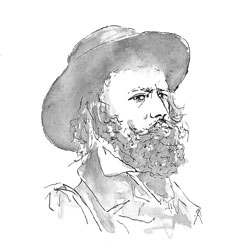Music and Meaning in Tennyson’s ‘In Memoriam’ (2): ‘Measured Language’
Take a look at this extract from Part 5 of In Memoriam, and ask yourself what Tennyson is suggesting about 'words':
I sometimes hold it half a sin
To put in words the grief I feel;
For words, like Nature, half reveal
And half conceal the Soul within.
But, for the unquiet heart and brain,
A use in measured language lies;
The sad mechanic exercise,
Like dull narcotics, numbing pain.
In words, like weeds, I'll wrap me o'er,
Like coarsest clothes against the cold:
But that large grief which these enfold
Is given in outline and no more.
If Tennyson here suggests that he sometimes finds it sinful to express his grief 'in words', if words always 'half conceal the Soul within', and if words can only ever convey what a person intends to communicate 'in outline and no more', then perhaps 'measured language' ought to be written off as a severely limited 'form' of expression? If you think this might be what Tennyson is suggesting in Part 5 of In Memoriam, what do you think about these four stanzas from Part 95 of the poem, in which Tennyson describes his experience of re-reading a piece of writing that Arthur Hallam composed before his death?:
So word by word, and line by line,
The dead man touch'd me from the past,
And all at once it seem'd at last
The living soul was flash'd on mine,
And mine in this was wound, and whirl'd
About empyreal heights of thought,
And came on that which is, and caught
The deep pulsations of the world,
Aeonian music measuring out
The steps of Time - the shocks of Chance -
The blows of Death. At length my trance
Was cancell'd, stricken thro' with doubt.
Vague words! but ah, how hard to frame
In matter-moulded forms of speech,
Or ev'n for intellect to reach
Thro' memory that which I became.
The poet does again assert that his own 'words' are 'vague' or inadequate, in the last of these four stanzas. However, Tennyson claims that it was 'word by word, and line by line' that his dead friend's living soul was 'flash'd' upon his own. What do you think Tennyson is trying to communicate about this mysterious 'medium', language, which half reveals and half conceals the soul; that is both inescapably 'vague' and yet is the only force which can enable real communion between the living and the dead? Furthermore, what is the significance of Tennyson's claim that his 'forms of speech' are 'matter-moulded'?
Most importantly for us perhaps, how - in this ninety-fifth part of the poem - does Tennyson relate the idea of ' music' to that experience which is mediated through language, and how, in turn, might this music and this experience be related to the idea that 'mind and soul' might be brought into better accord, to make 'one' vaster 'music'?
Follow the link below and we'll start both to explore some possible answers to these questions and to think about what relates them to our broader ideas on Music and Meaning in Tennyson.
[Go on to Music and Meaning in Tennyson's In Memoriam (3): The 'Speaking Voice']
